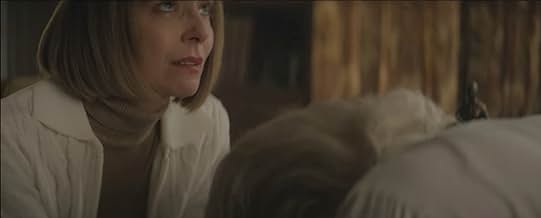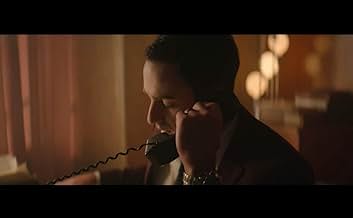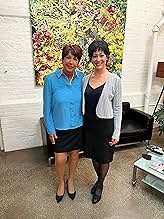Madoff: Le monstre de la finance
Titre original : Madoff: The Monster of Wall Street
Cette série documentaire retrace l'ascension et la chute de Bernie Madoff, le financier ayant orchestré l'une des plus importantes pyramides de Ponzi de l'histoire de Wall Street.Cette série documentaire retrace l'ascension et la chute de Bernie Madoff, le financier ayant orchestré l'une des plus importantes pyramides de Ponzi de l'histoire de Wall Street.Cette série documentaire retrace l'ascension et la chute de Bernie Madoff, le financier ayant orchestré l'une des plus importantes pyramides de Ponzi de l'histoire de Wall Street.
- Récompenses
- 1 victoire au total
Parcourir les épisodes
Avis à la une
I am becoming a CFE. Certified Fraud Examiner. There were things I was not aware of that Madoff did. I watched Wizard Of Lies and they left out some things I wish they would have put in. This documentary did a lot of justice and more insights than anything else I have seen. I really liked the depositions from Madoff himself. I have not seen any of these until now. I also enjoyed how real life Madoff employees gave their insights on what it was like to work with Madoff. Again, really enjoyed this documentary. I still hate how he defrauded all of these people and in turn, he called his "clients" Greedy!! What a scum-bag.
Bernie Madoff perpetrated one of the greatest frauds in history, but also one of the simplest: he simply pretended to have bought low and sold high, and with great reported profits nobody asked for their money back, at least not until the stock market crashed in 2008. This series describes him an a "monster", but I find it hard to hate him as much as the tech frauds: at least he wasn't claiming he could save the world. What's interesting is his ordinary origins (he was New York Jewish middle class, his right-hand man was Italian-American), and the sense to which the scam depended on affinity fraud (selling to people from his own background); the contrast with the Europeans he conned, old-money banking aristocracy, is striking. There are many remarkable details of this story, but like many Netflix documentaries it's slightly too long, with too many people commenting without adding that much information; no-one willing to confess to being aware of the fraud gives an interview (although there is film of Bernie himself claiming all responsibility).
For anybody who just heard faint echoes about the "Madoff monster" this documentary provides a good insight into his crimes. However, starting with weak points first, it suffers from a severe case of Netflexite, aka that annoying device of starting somewhere mid-point of a story and working its way back and forward quite randomly.
Second, we never get any info about what happened to the Security & Exchange Commission's inspectors who "failed" to inspect or to the SEC at large, the "commission" that showed only gross incompetence or even collusion with the monster.
The story starts with Madoff arrest on 11 Dec. 2008, the terrible year of the great crisis and works its way back to Madoff's birth, youth, marriage to Ruth and origins of his firm, with excruciatingly boring details. There are many interviews with employees from the legit Madoff operations and none from the illegal - no surprise there.
There are also many re-enactment, of which at least half is superfluous. In short, Madoff run his illegal scheme from the 17th floor of the Lipstick building and the legal from the 19th. Employees from the 19th were forbidden entrance to the 17th and even Mark and Andrew, Bernie's son were not allowed. But even if this would be considered at least bizarre and worth exploring, nobody did anything for decades.
Some external connections started sniffing around Madoff as far back as 1992, when his name was mentioned to the SEC. Since then, there were six investigations on Madoff, all botched.
At this stage I would have like to watch a documentary about SEC and what happened to those "inspectors" - I guess nothing, but still...
Four episodes about this complex yet easy fraud are long to digest and the tragic ending comes none too soon, with Mark committing suicide, Andrew dying of cancer, Ruth being destitute and Bernie dying in the slammer, also none too soon. A tighter editing and less flourishing would have helped.
Second, we never get any info about what happened to the Security & Exchange Commission's inspectors who "failed" to inspect or to the SEC at large, the "commission" that showed only gross incompetence or even collusion with the monster.
The story starts with Madoff arrest on 11 Dec. 2008, the terrible year of the great crisis and works its way back to Madoff's birth, youth, marriage to Ruth and origins of his firm, with excruciatingly boring details. There are many interviews with employees from the legit Madoff operations and none from the illegal - no surprise there.
There are also many re-enactment, of which at least half is superfluous. In short, Madoff run his illegal scheme from the 17th floor of the Lipstick building and the legal from the 19th. Employees from the 19th were forbidden entrance to the 17th and even Mark and Andrew, Bernie's son were not allowed. But even if this would be considered at least bizarre and worth exploring, nobody did anything for decades.
Some external connections started sniffing around Madoff as far back as 1992, when his name was mentioned to the SEC. Since then, there were six investigations on Madoff, all botched.
At this stage I would have like to watch a documentary about SEC and what happened to those "inspectors" - I guess nothing, but still...
Four episodes about this complex yet easy fraud are long to digest and the tragic ending comes none too soon, with Mark committing suicide, Andrew dying of cancer, Ruth being destitute and Bernie dying in the slammer, also none too soon. A tighter editing and less flourishing would have helped.
A very interesting documentary on a topic that I think is good to know for most people. But, in typical Netflix fashion, is dragged out over way too many episodes and cost you way too much of your time.
The lack of original footage has been made up by some acting, but all scenes seem endlessly repeated. Good they interviewed a lot of involved people and they got a hand on some original content though. But it feels like it could fit in a 1 hour documentary movie. So yes this is a great topic, but I'd rather advice to read a news article on it than to spend your hours of precious time on Netflix.
The lack of original footage has been made up by some acting, but all scenes seem endlessly repeated. Good they interviewed a lot of involved people and they got a hand on some original content though. But it feels like it could fit in a 1 hour documentary movie. So yes this is a great topic, but I'd rather advice to read a news article on it than to spend your hours of precious time on Netflix.
...Or how to lose 19 billion dollars...of other people's money. Bernie Madoff was indeed the monster of the title here, an ambitious, ruthless individual who found that the best way to not just personal fortune and fame but also tacit acceptance within Wall Street, was to create the world's biggest ever Ponzi Scheme, which basically as I understand it means taking other people's money without ever investing it, instead hoarding it and paying out withdrawal requests from this ever-growing stockpile of cash. Using secretive and in truth wholly rudimentary methods to report to his "clients", once he had everyone thinking he was the emperor, it took the market-shattering financial crash of 2008 to finally strip the charlatan of his credibility and finally expose him as the fraudster he was.
Netflix showed this rags-to-riches-back-to-rags saga over 4 episodes outlining Madoff's inexorable rise through Wall Street before the bubble burst in 2008 and his house of cards came crashing down. The story of course is as fascinating as it is cautionary, with almost every one of the human victims, not to mention the representatives of major financial institutions, being shown as having been completely blindsided by the apparently gravity-defying returns promised by Madoff to his exclusive but gullible not to mention greedy clients.
The series charts his express progress to the top and all the professional and luxurious accoutrements that went with it. With contributions from on the one hand, many of his office staff and actual video footage from Madoff's own depositions from inside prison, but notably not a word from any of his surviving family or even his second-in-command, as well as insights from financial journalists and investigators, including the young accountant at a rival who openly and early on called the sham for what it was, this was a darkly fascinating tale of greed and abuse of power on Wall Street. Almost as culpable you'd have to say, were the financial regulator of the New York Stock Exchange and the ratings agencies who throughout the whole affair completely missed the obvious with their laissez-faire policies coming home to roost with the ruin of many unsuspecting investors, including the French representative of one major investment fund who committed suicide days after the scandal broke.
My only complaint about this series is that it could perhaps have been edited down to a more manageable length plus I'm not a fan of the apparently new documentary technique of having lookalike-actors recreating actual events, especially here with far too much repetition of set-scenes - how many times did we have to watch "Madoff" strolling through his office in slow-motion?
Regardless of which, this documentary series held the attention of my wife and I throughout and even ended with a chilling statement that there may be other similar scandals awaiting discovery and that Madoff's fraud may not in fact be the biggest of them all, as it currently is.
Netflix showed this rags-to-riches-back-to-rags saga over 4 episodes outlining Madoff's inexorable rise through Wall Street before the bubble burst in 2008 and his house of cards came crashing down. The story of course is as fascinating as it is cautionary, with almost every one of the human victims, not to mention the representatives of major financial institutions, being shown as having been completely blindsided by the apparently gravity-defying returns promised by Madoff to his exclusive but gullible not to mention greedy clients.
The series charts his express progress to the top and all the professional and luxurious accoutrements that went with it. With contributions from on the one hand, many of his office staff and actual video footage from Madoff's own depositions from inside prison, but notably not a word from any of his surviving family or even his second-in-command, as well as insights from financial journalists and investigators, including the young accountant at a rival who openly and early on called the sham for what it was, this was a darkly fascinating tale of greed and abuse of power on Wall Street. Almost as culpable you'd have to say, were the financial regulator of the New York Stock Exchange and the ratings agencies who throughout the whole affair completely missed the obvious with their laissez-faire policies coming home to roost with the ruin of many unsuspecting investors, including the French representative of one major investment fund who committed suicide days after the scandal broke.
My only complaint about this series is that it could perhaps have been edited down to a more manageable length plus I'm not a fan of the apparently new documentary technique of having lookalike-actors recreating actual events, especially here with far too much repetition of set-scenes - how many times did we have to watch "Madoff" strolling through his office in slow-motion?
Regardless of which, this documentary series held the attention of my wife and I throughout and even ended with a chilling statement that there may be other similar scandals awaiting discovery and that Madoff's fraud may not in fact be the biggest of them all, as it currently is.
Le saviez-vous
- AnecdotesThe French aristocrat Thierry Magon de La Villehuchet committed suicide after losing an estimated $1.4 billion of his and other aristocrat's family fortunes in Madoff's scheme. This was the second time the very wealthy "famille Magon" lost a large part of its fortune. In July 1794, banker Jean-Baptiste Magon de La Balue and 18 other members of the family were guillotined in Paris and a large part of their castles and fortunes confiscated. This happened one year after the decapitation of King Louis 16 and his wife Marie-Antoinette, and ironically, only 9 days before the decapitation of the revolutionary leader Maximilien de Robespierre.
- ConnexionsFeatured in Jeremy Vine: Épisode #6.5 (2023)
Meilleurs choix
Connectez-vous pour évaluer et suivre la liste de favoris afin de recevoir des recommandations personnalisées
- How many seasons does Madoff: The Monster of Wall Street have?Alimenté par Alexa
Détails
- Date de sortie
- Pays d’origine
- Site officiel
- Langue
- Aussi connu sous le nom de
- Madoff: The Monster of Wall Street
- Sociétés de production
- Voir plus de crédits d'entreprise sur IMDbPro
- Durée
- 1h(60 min)
- Couleur
- Mixage
- Rapport de forme
- 16:9 HD
Contribuer à cette page
Suggérer une modification ou ajouter du contenu manquant
































